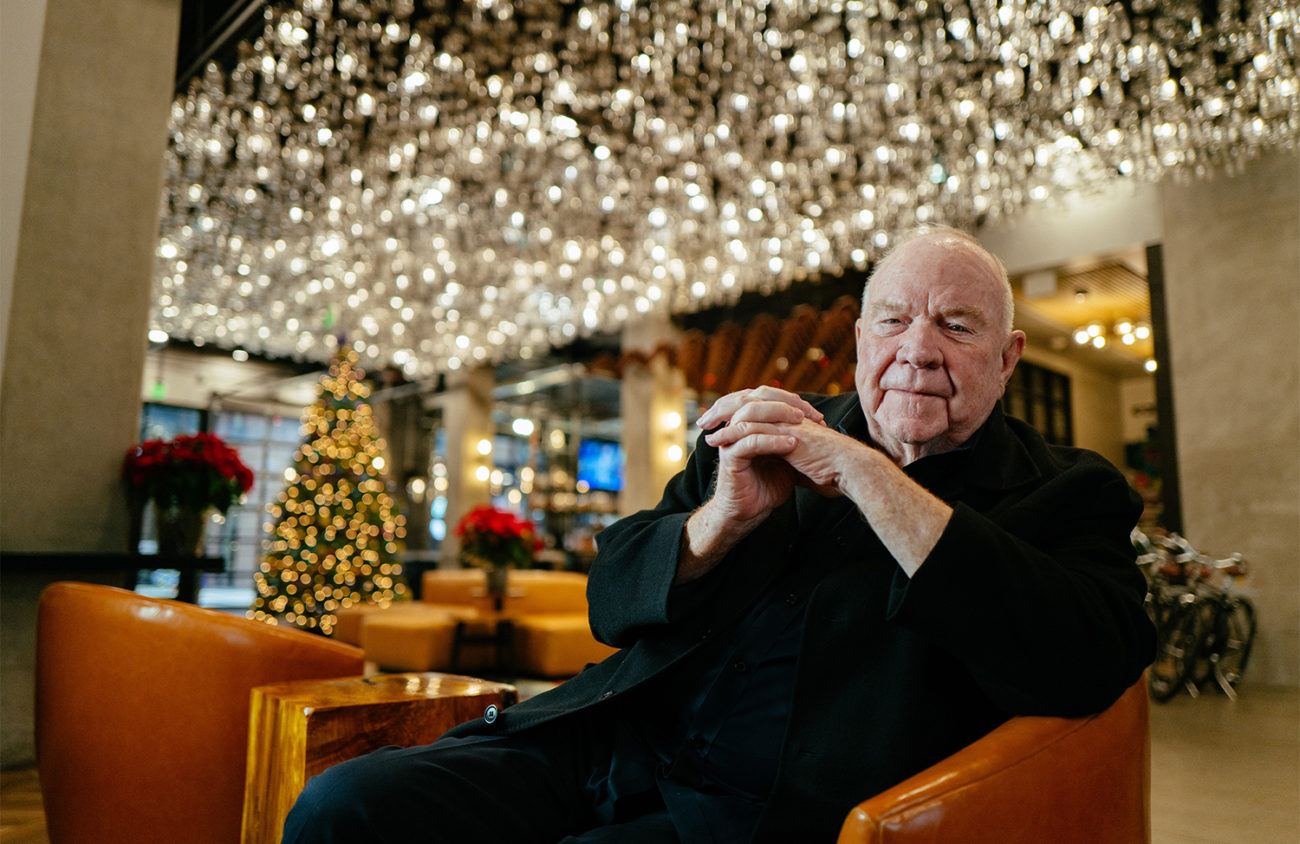Walk into the Market Alley that connects The Gordon Hotel to Fifth Street Public Market in Eugene, and you might for a moment think you’re in Pike Place Market in Seattle or Ghirardelli Square in San Francisco. Look again, and you’ll find a dash of Las Vegas.
That’s all on purpose, says Brian Obie, the businessman and former Eugene mayor who crafted that very specific vision for the main commercial development that’s linking the city’s older downtown to the coming high-end developments by the Willamette River.
As we mulled visions of Eugene, Eugene Weekly invited Obie to sit down and talk about his own vision for the city’s future. Of all the visionaries this town has, and we have quite a few, he’s probably had the greatest actual impact on our daily lives, going back to the days when he bailed out the struggling founders of Fifth Street Public Market by coming in as a silent business partner.
When I arrive for the interview with Obie, the first thing he does is hand me a book. The small, trim looking paperback has a photo on its cover of a red-haired young boy wielding a shovel and is titled Breaking Ground: Digging into the life and lessons of a small-town boy who’s reaching his big-time dreams.
“This will tell you all you need to know about me,” Obie says. “It’s hot off the press.”
Sitting in a cozy upstairs conference room at the new luxury hotel that bears his father’s first name, Gordon, it’s clear that Obie, 81, has reached a point in life where he sees himself as an elder statesman of creating Eugene.
He wants to make Eugene a destination city, a place that people around Oregon and even around the country go out of their way to visit. His development around Fifth Street Public Market is the cornerstone of that idea.
“The vision about the market district had to do with the thought we continue to have about ‘Destination Eugene’ that we think that we can create,” he says. “In fact, I’ve created a reason for people to come to Eugene.”
Obie as a businessman got his start in advertising — and in art. His dad, Gordon Obie, had a sign-painting business in Montana in the 1940s but also did fine art painting. In 1959, the family moved to Oregon, and in 1968, Brian Obie became president of Obie Outdoor Advertising.
The younger Obie got into city politics in the 1970s, starting with a seat on the Eugene Planning Commission.
It was there he began to think about the challenges of creating a successful city, and became fascinated with a design concept then in vogue called “urban villages” that called for mixed-use developments offering places to live, work and recreate within the same walkable area.
“Major cities at that time were creating them as part of their planning process,” he says. “I was intrigued with that, and they kind of stuck with me.”
It was also in the 1970s that Obie became an investor — first as that silent partner — in the then-struggling Fifth Street Public Market, a maze of small artisanal shops housed in a former poultry plant. Obie slicked up the operation and turned it around financially, he says, looking for a balance between the market’s hippie roots and a glossier, more commercial vibe that would attract a wider audience.
That’s where his fondness for Ghirardelli Square and Pike Place Market come in. For years, Obie says, he had stayed at Inn at the Market, a hotel inside Pike Place Market, when he visited Seattle. “The guests, you know, obviously eat and buy in the market. And it adds a great benefit both ways.”
Hence, the Inn at the 5th, which opened in 2012, and The Gordon Hotel, which opened in 2021, and which Obie admits was inspired in part by the Bellagio Hotel on the Las Vegas Strip, though with a Eugene vibe. The Bellagio has an art gallery that shows masterpieces on loan from art museums; the Gordon has original local art displayed all over the building and a craft table for kids in the lobby. The Bellagio has Dale Chihuly glass art suspended from the lobby ceiling; the Gordon has hundreds of glass Mason jars hanging over the lobby.
“Fortunately, it’s working,” he says. “Fortunately, the concept had value and legs, if you will. I would say that is the beginning of the vision of the market district.”
Even as he embarks on his ninth decade of life, Obie continues to look ahead to Eugene’s future. He made an offer on the abandoned Eugene Water and Electric Board building that sits on the riverfront not far from the Gordon Hotel. Along with proposals from three other parties, it was turned down.
“I think it’s an important building,” Obie says when asked why his company was interested. He insists he had no particular plan for it. “You know, we bought buildings in this neighborhood that we didn’t know what we were gonna do with. None that big.”
Asked to look ahead 20 years for Eugene, Obie stresses the goal of liveability and community pride — a theme that would be cited by some of the other visionaries EW checked in with.
“I think it should work on developing pride in itself,” he says. “It just seems like there was a time that the community had more pride in itself than I can recall. I experienced that enthusiasm, the energy around it. Right? People loved living here, and were proud of it. They were excited about it, were selling it to their friends as a great place to live.”
With the current cultural and political divisions in society, the way ahead is not obvious, he says. “We need somebody to get the community up.”
